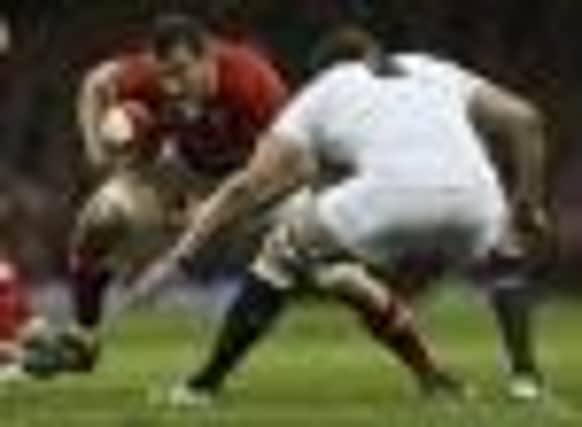Six Nations: Wales grab chances as England choke


It was a night of unfettered emotion in which the Wales players shed tears as they sang their national anthem, and red-clad men, women and children in the packed stands followed suit.
Underlying the build-up to this match was the knowledge that it was always going to be squeaky bum time in Cardiff because England have a well-worn track record of choking and Wales – well, the men in red have a record of taking chances just like these. In fact, Wales have never passed up a chance for a Grand Slam on the last day and their hard-bitten footsoldiers were in no mood to give up their status as Six Nations champions yesterday against a young, inexperienced England side, dominating territory and possession from the outset.
Advertisement
Hide AdAdvertisement
Hide AdThe result of Wales’ desperation and England’s determination was a game of almost unfeasible intensity, one that kept the fortress of the Millennium Stadium in a barely suppressed state of agitation for 80 remarkable minutes. Wales took the fight to England and rightly took the initiative on the scoreboard in a breathless, helter skelter match that seemed to be an example of perpetual motion.
Thanks in large part to the impact of defence coach Shaun Edwards, Wales have not conceded a try for almost 400 minutes now and they applied pressure throughout via the unerring boot of Leigh Halfpenny, with under-pressure England coughing up penalties with far too great a regularity, mainly at the breakdown. Had Wales stand-off Dan Biggar managed to land a drop-goal seconds before half-time then Wales would already have been out of sight at 12-3 with half the match remaining.
If anything, the juddering physicality and the intensity of the match ratcheted up after the break, and within ten minutes of the restart another England offside at the breakdown during a seemingly never-ending series of forward drives inside England’s 22 led to Halfpenny extending Wales’ lead to 12-3. Nine points: not just enough for Wales to deny England a Grand Slam, enough to see Wales retain their crown. Game on.
And then it was game won. Alex Cuthbert’s first try – which came from the ashes of an England three-on-one overlap criminally squandered by the blunt instrument which is Manu Tuilagi – effectively sealed Wales’ win, and it was simply a question of whether Wales could maintain their points cushion.
With England comprehensively outdone at the set-piece, out-thought at the breakdown and even stuttering with the boot – when was the last time Owen Farrell missed two straightforward kicks in a row? – that was never likely to happen. In the final 20 minutes, England’s yeomen visibly wilted as Wales turned on the afterburners, a Biggar drop-goal being followed by another Cuthbert try after a searing break from Sam Warburton. By the end, England were ragged, disoriented and in disarray.
Such an outcome is so familiar to those of us who remember when England last travelled to try to win a Grand Slam on Welsh soil in what turned out to be one of the most famous matches in the Championship’s history. This week the spirit of Scott Gibbs has been evoked countless times, and the replay of the stocky Wales and Lions centre slipping through four tackles in 1999 at Wembley to score the try which gave the Rob Howley-captained Wales side a one-point win that denied England a Grand Slam and gifted Scotland a well-deserved Five Nations championship in the last year before the Championship was expanded, has been almost on a loop on Welsh television.
That win was followed by a reprise the next year, when England surrendered a Grand Slam at Murrayfield in the driving rain, and then in 2001 as well, as Grand Slam-chasing England were undone in Dublin on the last day of the Championship for a third season in a row.
It is part of an unmistakeable pattern of England coming up short in the big matches over many years. That mental fragility on the road was there for all to see yesterday against England’s fiercest rivals. It was a sweet victory in so many ways: in the 132 years since the first Test match between the two nations, before yesterday Wales had won 55 matches and lost 56 against England. Historically there may not be a cigarette paper between these two sides, yesterday the gulf was huge.
Advertisement
Hide AdAdvertisement
Hide AdAnd to the victors go the spoils. Chief among the winners yesterday was former Wales captain Warburton, who not only dominated the breakdown but for the second year running comprehensively eclipsed his rival for the Lions captaincy, England skipper Chris Robshaw. Nor was he alone: the other Welsh winners included tighthead Adam Jones, scrum-half Mike Phillips, second row Alun-Wyn Jones, hooker Richard Hibbard, openside Justin Tipuric, both Welsh wings and full-back Leigh Halfpenny, all of whom cemented their place on the plane to Australia.
But the main winners were those watching this compelling duel between English grunt and Welsh verve. What a contest in a tournament that has so often flattered to deceive.